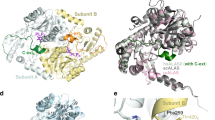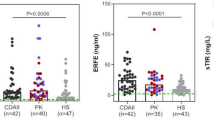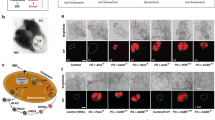Abstract
THE cells of many tissues, including bone, red cells, liver, brain and nerves, absorb lead1 which accumulates chiefly on the mitochondrial membrane. Here it disturbs mitochondrial metabolism and produces the swelling and disruption revealed by electron microscopy2. The most obvious metabolic defect is the inhibition of the synthesis of haem (and porphyrin). Lead inactivates at least three mitochondrial enzymes in the haem pathway (δ aminolaevulinic acid synthetase3, δ-aminolaevulinic dehydrase3, and haem synthetase4). This aspect of lead toxicity (reviewed in ref. 5) reduces haem production and leads to the accumulation and excessive excretion of several porphyrin intermediates. Lead seems to affect red cells chiefly by causing increased destruction and interfering with haemoglobin synthesis, as judged by the presence of ring sideroblasts in the bone marrow and hypochromia of the red cells. In normal red cell precursors the synthesis of haem and globin is finely balanced, but in diseases such as sideroblastic anaemia7 and iron deficiency anaemia (R. Barr, A. V. Hoffbrand and J. M. W., unpublished) a defect in haem synthesis leads to a disturbance of globin synthesis. A previous report indicated that globin synthesis was defective in lead poisoning8, but no reports have dealt with the synthesis and assembly of α and β chains, which we have now studied.
This is a preview of subscription content, access via your institution
Access options
Subscribe to this journal
Receive 51 print issues and online access
$199.00 per year
only $3.90 per issue
Buy this article
- Purchase on Springer Link
- Instant access to full article PDF
Prices may be subject to local taxes which are calculated during checkout
Similar content being viewed by others
References
Barry, P. S. I., and Mossman, D. B., Brit. J. Indust. Med., 27, 339 (1970).
Bessis, M., and Breton-Gorius, J., Blood, 19, 635 (1962).
Dresel, E. I. B., and Falk, J. E., Biochem. J., 63, 80 (1965).
Goldberg, A., Ashenbracker, H., Cartwright, G. E., and Wintrobe, M. M., Blood, 11, 821 (1956).
Goldberg, A., Seminars Haematol., 5, 424 (1968).
Waldron, H. A., Brit. H. Indust. Med., 23, 83 (1964).
White, J. M., Brain, M. C., and Ali, M. A. M., Brit. J. Haematol., 20, 263 (1971).
Kasenaar, A., Morell, H., and London, I. M., J. Biol. Chem., 229, 423 (1957).
Clegg, J. B., Naughton, M. A., and Weatherall, D. J., J. Mol. Biol., 19, 91 (1966).
Gabuzda, T. G., Melvin, M., Silver, R. K., and Sachs, C., Proc. Thirteenth Congr. Intern. Soc. Haematol., 8, (1970).
Wood, N., Whittacker, J. A., Clegg, J. B., and Weatherall, D. J., Abst. Brit. Soc. Haematol., 19 (1971).
Trakatellis, A. C., Heinle, E., Montjar, M., Axelrod, A. E., and Jensen, W. N., Arch. Biochem. Biophys., 112, 89 (1965).
Author information
Authors and Affiliations
Rights and permissions
About this article
Cite this article
WHITE, J., HARVEY, D. Biological Science: Defective Synthesis of α and β Globin Chains in Lead Poisoning. Nature 236, 71–73 (1972). https://doi.org/10.1038/236071a0
Received:
Revised:
Issue Date:
DOI: https://doi.org/10.1038/236071a0
This article is cited by
-
Lead effect on the oxidation resistance of erythrocyte membrane in rat triton-induced hyperlipidemia
Biological Trace Element Research (1993)
-
Bone marrow and peripheral blood globin chain biosynthesis in iron deficiency
Blut (1982)
-
Properties of slowly rotating helium II and the superfluidity of pulsars
Journal of Low Temperature Physics (1980)
-
Genetic model for observed distributions of proportions of haemoglobin in sickle-cell trait
Nature (1977)
-
Haem deficiency and chain synthesis
Nature (1974)
Comments
By submitting a comment you agree to abide by our Terms and Community Guidelines. If you find something abusive or that does not comply with our terms or guidelines please flag it as inappropriate.



